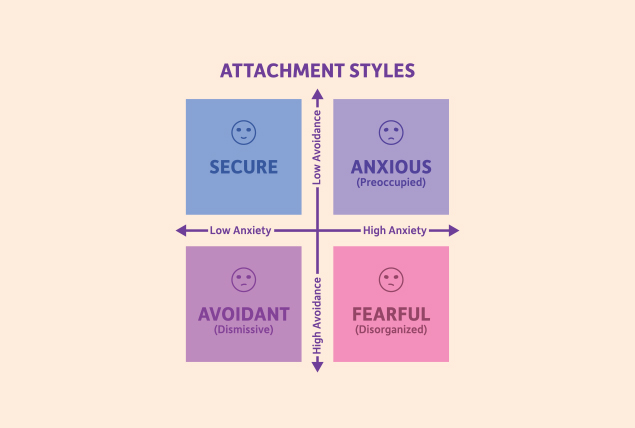How Does Your Attachment Style Impact Your Sex Life?

Key Points
- Attachment theory suggests that early bonds with caregivers influence how sexual dynamics can affect your future relationships.
- Attachment styles also extend to sexual experiences and can impact sexual satisfaction and dysfunction.
- Based on early experience, attachment styles may become a "default setting," but they're not set in stone. You can change them.
Attachment theory is an evolutionary, ethological and psychological theory based on the relationships young children have with their primary caregivers. These early relationships and forged bonds can influence how someone manages relationships throughout their lives.
There are four attachment styles: secure attachment, anxious attachment, avoidant attachment and disorganized attachment. These styles are developed during the first six months to two years of life as babies observe their caregivers, watching for how they typically respond and by figuring out what to expect from others.
Understanding your own attachment styles can give you valuable insights into dating behaviors and how you handle relationships. Plus, they can be a window into sexual dynamics.
Of course, the biggest question of all is whether you can change your attachment style.
How an insecure attachment style can hinder your sex life
In addition to lower levels of relationship satisfaction, people with insecure attachment styles tend to have higher degrees of sexual dysfunction, according to research. That makes sense given the high degrees of intimacy and vulnerability associated with sex, said Martha Tara Lee, D.H.S., an AASECT-certified sex educator and clinical sexologist with Eros Coaching in Singapore.
Various factors can contribute to these issues. Let's look at the five most common factors.
1. Trust issues
People who have trouble trusting others can find it challenging to allow themselves the experience of pleasure, explained Kristal DeSantis, L.M.F.T., a therapist and author and the founder of Austin STRONG: Relationship Building Center in Texas.
"Those with an insecure attachment style have experienced other people as unreliable, unresponsive, inconsistent or abusive—generally, as unsafe in some way," she said. "This may lead to feeling more guarded when engaging intimately or sexually with a new partner."
2. Shame around sex
"Many people who grew up with an insecure attachment style have internalized messages around love, intimacy and sex that places a burden of shame on them for liking what they like, not liking certain things, or feeling like the topic itself is shameful or taboo," DeSantis said. "That can create a barrier to exploring sexual pleasure and intimacy."
A negative self-perception, such as body-image issues, often accompanies insecure attachment styles, which can result in shame or discomfort during sexual experiences, Lee said.
3. Performance anxiety
People who veer toward insecure attachment may try to avoid emotional connection, DeSantis said.
They may also fear judgment by a partner, overfocus on pleasing their partner sexually and worry about not meeting expectations, Lee said. This can lead to self-questioning, comparisons and struggling to be present.
Recommended
- What Is It Like to Date an AI Chatbot?: For some people, companion chatbots offer thrilling possibilities for romantic relationships.
- Giddy Presents The Naked Truth: Can I Have Casual Sex With Friends?: AASECT-certified sex therapist Savannah Van Besien answers your most intimate questions.
- When Your Relationship Is Running On Empty, You’re In A Silent Divorce: Are you delivering the bare minimum in your relationship? It may be time to reevaluate.
4. Communication challenges
Often, people who grew up with unreliable caregivers weren't given the tools, skills or language to talk about sex, emotions or intimacy in a way that's transparent, honest and sets clear boundaries, according to DeSantis. The struggle to communicate their needs and desires can lead to misunderstandings, unmet needs and a lack of satisfaction or safety, Lee added.
5. Past trauma
Some people with insecure attachment styles have a history of relational trauma. "Whether or not this trauma was explicitly sexual, the legacy of trauma can leave lasting marks on someone's relationship with their own body, sex, sexual identity and self-esteem," DeSantis said. "Our bodies can hold us in a 'protection mode,' which can create challenges for engaging in something as vulnerable and connecting as a sexual or intimate encounter."
Can attachment styles change?
"Even though attachment styles usually develop early in life, they're not set in stone," said Clare Rosoman, Psy.D., a clinical psychologist in Brisbane, Australia, and the author of Life After Love: An Emotionally Focused Guide to Relationship Loss.
"A person's attachment style acts as a 'default setting' based on their early attachment
experiences with primary caregivers," DeSantis said. "However, it is not a 'diagnosis.' As you move through adolescence and adulthood, your attachment style can adapt and change. Bad relationships wound, but healthy relationships heal."
For example, even if you began life with a secure style, one toxic or abusive relationship can chip away at that security, according to DeSantis.
Similarly, if you have an insecure attachment style and you enter into a healthy, stable relationship, you may gradually develop an "earned secure" attachment style, Rosoman said.
"If we think of attachment strategies as learned coping strategies that helped us to survive early in life, then we can be grateful for our adaptiveness," she added. "As we move through life and accumulate experiences in relationships with others, some of our early learnings will be compounded and others will be revised."
How you can heal an anxious attachment style
Identifying your attachment style and relationship triggers is one of the best things you can do to work on healing an insecure attachment style and strengthening your relationships, according to Rosoman.
"Discover how you learned to cope in the ways you do," she said. "Look at what works well, keeps you safe and keeps you close to those who matter most. Look at what you do that gets in the way of having the relationships you want and work on it."
Living and Dating With Stress: Starting up new relationships can be stressful, but there are effective strategies that help. Learn how stress impacts your everyday life and dating, and what you can do to prevent and cope with stress. Find out some great resources for stress management.
Communicate your findings with your partner so they can better support you, DeSantis said.
Some ways to develop a secure attachment style include choosing healthy partners, practicing self-care and self-compassion, and seeking therapy.
Choose healthy partners
People with insecure attachment styles might gravitate toward partners who reinforce their insecurities.
"Choosing partners who consistently provide love, respect and security can help you to move toward a healthier attachment style," said LeMeita Smith, Ph.D., L.P.C., a psychological advisor at Taratoo and the director of clinical services at United Health Services in the Dallas area.
They can also model secure behaviors, such as honesty, consistency and responsiveness.
"One of the most effective ways to learn secure attachment is by experiencing a safe relationship," said Allison Raskin, a mental health advocate and New York-Times bestselling author and the founder of the Emotional Support Lady Substack. "It's not work we can do all on our own in preparation for a relationship. Some of it has to be done on the job."
Practice self-care and self-compassion
You can improve self-esteem and self-worth by taking care of your mental, emotional, physical, and spiritual needs, and by treating yourself with kindness, understanding and forgiveness, Smith said.
"Be compassionate with yourself and gentle with the vulnerable parts of you," Rosoman said. "Hang out in your emotional world. Be curious about who you are and what you need, and honor that."
Seek therapy
Working with a qualified therapist or counselor can help you to explore and process past experiences that might have contributed to an insecure attachment style, according to Smith.
"Therapy provides a safe space to develop healthier coping mechanisms and improve self-awareness," she said.
The bottom line
Insecure attachment styles can inhibit emotional and physical intimacy in several ways, but with self-compassion, inner work and a partner's support, it's possible to overcome challenges.
"Remember that developing secure and healthy relationships is an ongoing, nonlinear journey," DeSantis said. "It's important to be patient with yourself and your partner as you navigate the complexities of attachment styles and interpersonal dynamics."


















